![[Metroactive Music]](/music/gifs/music468.gif)
[ Music Index | Metro | Metroactive Central | Archives ]
California Country
Far from the big hats of Nashville, California has nourished generations of country musicians with grit and flash
By Richard Von Busack
Our journey out is from L.A. to Oklahoma in 1964, in a car with my harried mom at the wheel and five kids in the back. We learn many new words on the trip: Fan belt. Alternator. Radiator. Finally, we arrive, standing under the yellow bug light at the end of the longest journey I've taken in my young life, two hours past midnight south of Oklahoma City in the town of Moore, where my Grandma and Grampa Jack are living.
I love it there and come back for nine summers. I am most impressed by a scary wailing sound that all the radios play. Can't get it out of my head. Steel guitar fills almost every song on the radio, and those high, wailing voices rival the guitar's velvety sting. I have never hear such sounds anywhere near L.A. except once--and what a huge shock--on a Judy Collins record, in her version of Ian and Sylvia's "Someday Soon."
ABOUT FOUR YEARS AGO, a short-lived radio station in San Jose played that old music, the voices swollen with regret and yearning, the steel guitar's glasslike shards all over the picture. I tried telling everyone I knew, but the station was sold and closed a month after I discovered it.
I was listening to it on the Almaden Expressway during a heat wave when one of the DJs patched in a call from a visiting cross-country truck driver from Henryetta, Okla. Lots of hog farming there, the trucker said, but they don't even have a classic country station in Oklahoma anymore.
I don't have roots to visit, really, but if I drove around looking for them--as I do in my dreams about once every two weeks--I'd have to bring that evocative music with me. It's a part of our heritage, and it's almost vanished from the airwaves.
What I never knew until just recently is that California--the California where I grew up--was the source of so much of that old country sound. There was a time when California was the engine of country music and Nashville was just a whistle stop. Nashville now is as necessary to the success of a country artist as New York is to that of a literary artist. And yet in our state, too, we possess the seeds of a revival, a chance to reclaim country as the tough, vibrant multifaceted music it once was.
Author Gerald Haslam's Workin' Man Blues is, as he calls it, "the first, but not the last word on the subject." The new collection Rebels and Outlaws (EMI) can serve almost as a soundtrack for Haslam's book. The CD offers a tour through some of the lively, disreputable music that sprouted outside of Nashville and certainly wouldn't be welcome there today.
The Rebels CD includes "Branded Man" by Bakersfield's Merle Haggard, who wrote the song that lends Haslam's book its title. Johnny Cash, who lived in Ventura when he was coming up with his own harsh style, weighs in with "Folsom Prison Blues," a song that memorializes a side of California that isn't on the postcards.
California is famous as the state of artifice. And yet it is also the state where the artificial becomes real. In country music, nothing is as pure as it looks. The singers of the first half of the century knew all sorts of music--Tin Pan Alley as well as homegrown. The music that came out of California could be show-biz tunes sung by authentic Westerners. Here in California, Marion Morrison became a singing cowboy (dubbed in, of course) named "Singing Sandy" before he was better known as John Wayne. Here in California, Leonard Slye became Roy Rogers. And I say "became" because that's what happened: he was Roy Rogers in death just as he was in life.
Gene Autry, a Californian from Oklahoma, later the wealthiest of the singing cowboys, was the subject of "the first popular commercialization of country music on a grand and sweeping scale," writes historian J.R. Young. In our state, personas take on a life of their own.
In Haslam's words, Hollywood changed "hillbillies to cowboys and cowboys to fops." The best-dressed singing cowboys were togged out in flamboyant embroidered satin costumes created by L.A.'s cowboy couturiers, Nudie and N. Turk. Years later, the styles these two immigrant tailors created were de rigueur for Nashville country stars. They may have the car Hank Williams died in on display in Nashville, but the Nudie's suit in which Hank was buried was made in California. The singing cowboy is a California creation, and if the guise has become a joke, the clothes themselves are seen on country-pop performers from Las Vegas to Branson to Nashville.
In the 1930s and '40s, everyone came to California to work and to fight a war; the process of mixing traditions became a tradition here. From the cool country of L.A. in the '70s and '80s to the blood-red redneck music of Haggard in Bakersfield, the musical landscape was a tangle of influences and contradictions. Meanwhile, in Nashville, supposedly the home of country music, there's as much artifice, but the influences don't mix. Nashville is so concerned about its purity, the countryness of its music, that it has become stodgy, colorless.
"This is the book Nashville didn't want published," Haslam says from his Sonoma County home. The former professor of English at Sonoma State says that he had trouble getting musicians to speak on the record. The tightly run country-music scene didn't welcome a critical look.
"Country music outsells rock," Haslam reminds me. "It's both enormously popular and restrictive. I know country has a great audience. I can understand what they've done from a dollar-and-cents point of view. The situation is summed up by something Barbi Benton said. I realize she's better known as Hugh Hefner's hard-nippled girlfriend, but she's also a country singer. She said, 'I like country now because it's on the cusp of rock. If I'd listened to Hank Williams, I probably wouldn't have liked him.'"
Haslam pauses to let that nugget sink in before continuing: "This was an area I'd never seen anything written about. I was trying to expand the definition of California and also expand the definition of California music. It was my goal to broaden the subject, not to kick out the people that have achieved prominence but to bring California out."
Haslam recalls growing up in Delano, when "you could hear on the radio station bluegrass, rockabilly, cowboy songs, singing, country pop, the Bakersfield sound. You'd hear novelty songs. One vocalist would be singing in the high-lonesome pinched nasal; the next would be in full-throated vibrato. You'd have novelty songs. There's nothing wrong with country pop, but there's something wrong with it being the only thing around."
BUT IF WE ain't anywhere now, at least we've been somewhere. Haslam's encyclopedic survey reveals not just the obvious players, like Buck Owens and Merle Haggard, the two most important country stars California ever produced, but also Dwight Yoakam, Glen Campbell and Gram Parsons. Did you know that Bob Wills lived outside Sacramento for 10 years, owning a nightclub and a ranch? His brother, Billy Jack Wills, also a bandleader, made California his home. Ernie Ford may have hailed from Tennessee, but he made his first big impression in Pasadena.
The ill-fated Spade Cooley is remembered as the most virtuosic of Western swing-band leaders, "the Ed Sullivan of the West Coast," with guests like Frank Sinatra and Sarah Vaughan. Bobbie Gentry was living in Palm Springs, not Mississippi, when "Ode to Billie Joe" became a hit. When Long Beach's own Nitty Gritty Dirt Band recorded "Let the Circle Be Unbroken" in 1972, the Nashville Tennessean newspaper called it the "best record to come out of Nashville in 25 years." Iris DeMent, also of Long Beach, is one of the most distinctive voices in country in the last decade.
Haslam makes a strong case for California as the equal of Tennessee and Texas as a home for country music. But history is not all made by famous names, and to my mind it's a chapter on a mostly forgotten band that focuses on what made California a greenhouse for transplanted talent.
"To understand why many longtime fans of country music consider Nashville's pop-influence incarnation of country to be terminally bland, one needs to listen to 45-year-old recordings of the Maddox Brothers and Rose," Haslam writes.
The Maddoxes were the hottest country combo of the San Joaquin Valley, based in Modesto, well known in San Jose and wherever else farmers still toiled. El Cerrito's own Arhoolie label keeps the memory of this red-hot band alive on the anthology The Maddox Brothers and Rose: America's Most Colorful Hillbilly Band.
In their stylings, the Maddoxes were essentially Californian. Although the music was country, western and gospel, their approach was pumped up with showmanship. Vocalist Rose, the wildest, the corniest, took to the stage in satin cowboy outfits that Tennessee Ernie Ford claimed "made Liberace look like a plucked chicken." Fred Maddox laid down the bass line and shouted out ad libs ("I cain't stand it! I'm goin' crazy!"). Fred would also puncture a blues or a ballad like "Brown Eyes" with exaggerated stage sobbing, rebel yells or catcalls.
Rose's version of "Milk Cow Blues"--one of the earliest tunes Elvis ever recorded--is nearly unequaled for coiled sensuality and sweetness. (The self-conscious Rose, a girl not far out of her teens when she recorded it, has to laugh at herself when she hears how sultry she got.) The Maddoxes' wild "Mean and Wicked Boogie" sums up the scrappiness of California country--of the state's oil-patch roughnecks and migrant farmers. The band's sexy "Sally Let Your Bands Hang Down" memorializes a successful bad girl: "I'm gonna find out what she's got/Makes the boys think she's so hot."
The Maddoxes were fast, swinging, irresistible; their kind is not welcome in Nashville today, and Rose Maddox has no place in the Country Hall of Fame. The Maddoxes rode the train from Alabama to California in one of those train cars that didn't have seats. In their story of a family moving into music straight from migrant farming, you'd think you were seeing another example of how country music was brought here by the Dust Bowl.
Haslam found the opposite to be true. "The Okies entered a state with a well-established country-music community," he writes "California was the home of a music industry, not just the movie industry."
In San Jose, Cal Shrum and his Rhythm Rangers on station KEEN played music for an audience of new arrivals. Shrum was a veteran of Mexican radio, from one of those stations that blasted America with a signal that reached almost all the way to Canada. Mexican radio spread the Maddoxes' music throughout the West.
After the era of the singing cowboy and honky-tonkers like the Maddoxes, Haslam continues his study. A brief outline: In the '50s, San Francisco's Harry Smith compiled his monumental Anthology of Folk Music, the most important of all bootleg recordings (recently rereleased by Sony). Smith's anthology--eloquently memorialized by critic Greil Marcus in his book about Bob Dylan's Basement Tapes, Invisible Republic--spurred a revival of long-forgotten country, folk and western singers.
In the 1960s, Johnny Cash created harsh, dangerous music; later in the decade, Gram Parsons, of the Byrds, transmitted bluegrass and country to his generation. In the '80s, performers as varied as Lone Justice, Rank and File, the Gun Club and Juice Newton were all playing country.
Haslam's last chapter revives some local players: the late Country Dick Montana of the Beat Farmers, who used to slide his drunken self down the bar at the Cactus Club in downtown San Jose during a show, Buck Naked (RIP) and the Bare-Bottom Boys reviving a noble tradition of novelty songs with titles like "Bend Over, I'll Drive." Workin' Man Blues concludes in the '90s, with cow-punk bands sprouting up all over the golden state like Scotch broom.
IN A GOLD VINYL hassock, rectangular, resided my grandfather's small record collection, all the Johnny Cash you could handle: Apache Tears, Ring of Fire, Live at San Quentin, Ride This Train, On TV With the Tennessee Two (a "live" recording augmented by weird bursts of cheers and applauds, rising and falling at the same volume and same intervals, indicating the heavy hand of some crafty sound engineer sweetening the recording).
All music is a mnemonic device. All I have to hear is the dull thunk of Cash's guitar, and the bass quaver of his voice, to remember the sharp smell of crude oil from the rig in the front pasture, the bottomlessly mellow taste of my grandfather's Falstaff when I'd sneak a sip of it or the jungly, humid smell of Oklahoma in July.
The cover of Rebels and Outlaws features a glorious photo of Cash giving the photographer the finger. "You can kiss my famous ass," Cash seems to be saying, a squint accentuating his squashed nose, his six-string guitar with one peg missing below the sound hole of his guitar.
He's wearing a jumpsuit. Backstage, no doubt, because onstage his livery was always black. (Medvedenko: "Why do you wear black all the time?" Masha: "I'm in mourning for my life."--Chekhov, The Seagull.) Here is Cash as yet unChristianized by his good ladywife, June Carter (see story on page 31). "Not final cover art--Advance CD" whimpers the caption in a small typeface. What would the Bad Old Cash have to say about the current state of country: all those semi-anonymous soft-rock hat-acts belching forth from Nashville.
These young people. They may dress like goonie birds, can't read a lick and sass their elders, but at least the little bastards sure are giving Johnny Cash the honor he deserves.
Rebels and Outlaws is a capsule for the uninitiated--damn, there's a lot of uninitiated in this world. Tex Williams, of "Smoke Smoke Smoke (That Cigarette)" fame, delivers a rouser here, "Downtown Poker Club," about a cowpoke cleaning up a crooked card game, and Tex Ritter's macabre "Blood on the Saddle" is also ready to tighten the wigs of a new generation.
Rockabilly queen Wanda Jackson checks in with a joyful "Riot in Cell Block #9," and the Louvin Brothers sing of the murder of the "Knoxville Girl" all over again. Speaking of killing, Outlaw Willie Nelson endorses this CD, which is the most entertaining history lesson some people will ever have. Nelson writes, "They could kill the whole record industry with this!" And not a moment too soon.
RECENTLY, I SPENT about six hours listening to a "Young Country" radio station. I wish I could name names. It was hard to identify the singers, since the songs were scantily credited. The contents: a few ballads of syrupyness indistinguishable from light pop, synthetic keyboards, and only a telltale fiddle or a Southern accent to distinguish the songs from soft rock. Sometimes a steel guitar was dimly heard on the horizon of the mix--never a glistening razor, always a butter knife.
Certainly I didn't hate it. There's nothing to hate. As is true of most modern pop, I had to remind myself that the radio was on. A lot of music now seems to be the next best thing to silence. It sells because it's easy to tune out.
The music that used to reflect the dislocation of divorces and moving on is grounded now, completely unprovocative. The key motif in the songs I listened to seemed to be reconciliation. Affairs aren't had; they're thought about and avoided. This form of music that used to reflect excess speaks of moderation. This is music that has joined the Promise Keepers.
What can be done? Gerald Haslam has a suggestion. If we think of California as having a musical tradition, some artists may be inspired to explore their own passions instead of catering to the demographic. Local country can be "one more component of California's cultural blend, where diversity is the rule," Haslam suggests.
But California is a vague regional identity. When he was a kid in Bakersfield, Haslam tells me, he'd leave to visit his grandparents in the Bay Area. That was like going to another world. If he went to Texas to visit his father's people, that was more like going across the street.
The way Haslam describes Bakersfield, it's exactly the opposite of L.A., which was for me, as it always has been, a tangle of conflicting signals. Because Haslam praises Haggard's populism, I relistened to Haggard and felt that bile rising up again on hearing "Fightin' Side of Me," in which Haggard promises an ass-kicking to the unpatriotic. "If you don't love it, leave it. Let this song be a warning."
I always agreed with George Orwell that "my country, right or wrong" is as meaningless as "my mother, drunk or sober." The old Haggard in those angry days was a Southern Californian baiting the effete North. (In "Okie from Muskogee," he denounced those "hippies out in San Francisco." Richmond's own Chinga Chavin, who sometimes played at the Crossroads in Santa Cruz, took revenge with an answer song: "I'm Proud to Be an Asshole From El Paso.") Haggard may have calmed down, but the rivalry hasn't. As Workin' Man Blues points out, the gap between the rich and the poor is spreading faster in California than in the rest of the U.S., a trend that doesn't bode well for the health of marginal types like musicians.
Yet one of the reasons I pay a sky-high Bay Area rent is because the old music is remembered here at KFJC and KUSP and KPFA and KPIG, stations filed under the Gavin Report's buzz word for pre-Nashville music, "Americana"--stations where Haggard follows Robert Earl Keen follows the Austin Lounge Lizards (novelty-song wizards that they are).
Here in San Jose, we have Sidesaddle, the mostly female bluegrass band holding down a weekly set at Sam's Barbecue in Campbell. Later this month, Red Meat, the best Bay Area country-revival band, will open for Buck Owens in San Francisco. At the more Nashvillian extreme, there's the Saddle Rack, probably the most gargantuan Western nightclub in the state. A stone's throw from the Santa Clara Valley is Down Home Records in El Cerrito, the best repository of historic country music on the West Coast.
Merle Haggard describes why there'll always be country music: "Country music is feelin' and heart, not just a bunch of stuff some asshole says the public wants because he's made 'an extensive study of the market.' " Even the most booming markets sag sometimes. But the wild times and hard times reflected in nearly 80 years of California-made country lie waiting like an aquifer, ready to spring forth for new listeners.
Rebels and Outlaws Various artists; Capitol Records
The Maddox Brothers and Rose: America's Most Colorful Hillbilly Band, Vol. 1 Arhoolie Records
[ San Jose | Metroactive Central | Archives ]
Copyright © Metro Publishing Inc. Maintained by Boulevards New Media.
![]()
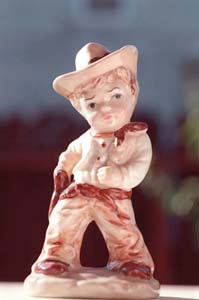
THEY SAY YOU CAN'T RUN FROM YOUR TROUBLES. But the "they" who say it--they ain't American. The whole history of the country is about packing up the buckboards and getting out of Dodge before the gunfights start up again. Indians, yellow fever, gangsters, sheepherders, locusts, Baptist crusaders, the buffalo herds ... there's always some kind of spur to light out and see the new territory.
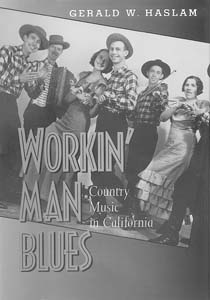
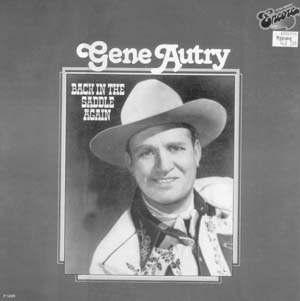
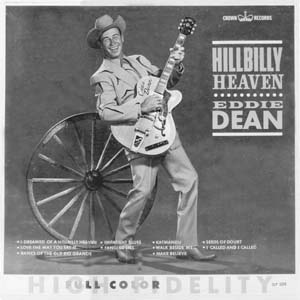
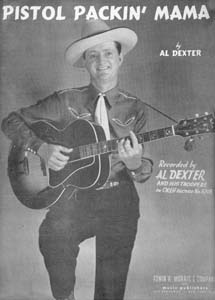
Workin' Man Blues By Gerald Haslam; UC Press; 380 pages; $29.95 cloth
From the May 13-19, 1999 issue of Metro.